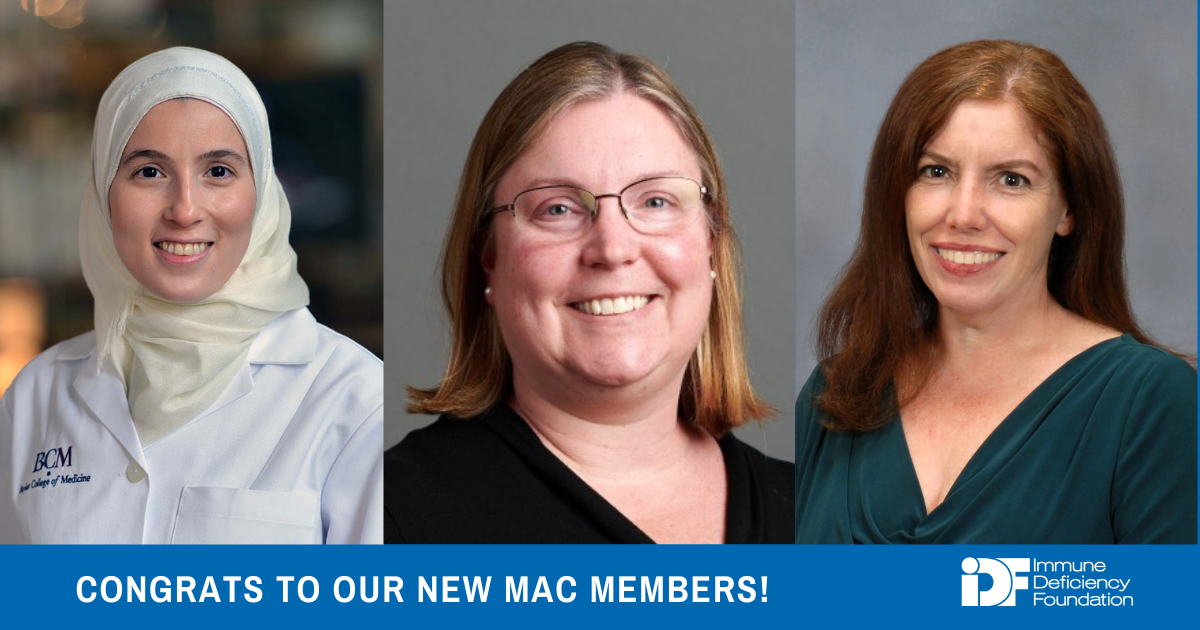
-
Understanding primary immunodeficiency (PI)

Understanding PI
The more you understand about primary immunodeficiency (PI), the better you can live with the disease or support others in your life with PI. Learn more about PI, including the various diagnoses and treatment options.
-
Living with PI
-
Addressing mental health
-
Explaining your diagnosis
- General care
- Get support
- For parents and guardians
-
Managing workplace issues
- Navigating insurance
-
Traveling safely

Living with PI
Living with primary immunodeficiency (PI) can be challenging, but you’re not alone—many people with PI lead full and active lives. With the right support and resources, you can, too.
-
Addressing mental health
-
Get involved

Get involved
Be a hero for those with PI. Change lives by promoting primary immunodeficiency (PI) awareness and taking action in your community through advocacy, donating, volunteering, or fundraising.
-
Advancing research and clinical care
-
Grants
-
IDF surveys
-
Participating in clinical trials
-
Diagnosing PI
-
Consulting immunologist
-
Clinician education

Advancing research and clinical care
Whether you’re a clinician, researcher, or an individual with primary immunodeficiency (PI), IDF has resources to help you advance the field. Get details on surveys, grants, and clinical trials.
-
Grants
IDF’s Medical Advisory Committee (MAC), which advises the foundation on key clinical and research issues that advance the understanding and potential treatment of primary immunodeficiency (PI), is thrilled to welcome three new members as of January 1, 2023: Dr. Joud Hajjar of Texas Children’s Hospital, Dr. Rebecca Marsh of Cincinnati Children’s Hospital Medical Center, and Dr. Elena Perez of Allergy Associates of the Palm Beaches.
“Drs. Hajjar, Marsh, and Perez each bring a diversity of expertise, a wealth of knowledge, and a commitment to excellence that will serve the MAC, and the patient constituency of IDF, very well,” said Dr. Kate Sullivan, chair of the MAC and a pediatric immunologist at Children’s Hospital of Philadelphia.
Hajjar was drawn to the field of PI early in her medical training while studying at Aleppo University in Syria.
“I encountered a patient with immunodeficiency who could not start immunoglobulin replacement therapy due to the lack of resources. This was shocking to me at the time, and yet it is still true for many children in developing countries worldwide, ” Hajjar said. “This case continues to inspire me to think about ways to improve the care of immunodeficient individuals worldwide.”
Hajjar completed her residency in internal medicine in Lebanon at the American University of Beirut and additional residencies in internal medicine and palliative medicine at Indiana University School of Medicine and MD Anderson Cancer Center, respectively. She did her allergy and immunology fellowship at Virginia Commonwealth University before moving to Baylor College of Medicine for her master’s and a Ph.D. in clinical investigations.

Dr. Rebecca Marsh, and Dr. Elena Perez.
Hajjar is currently an assistant professor at Baylor College of Medicine and clinic chief of adult allergy and immunology at Texas Children’s Hospital.
“I hope to work with other [MAC] members to find ways to further support clinically relevant research that directly impacts diagnosis, management, or clinically related outcomes,” she said of her election to the MAC.
For Marsh, “specializing in primary immunodeficiency allowed me to combine my love of immunology with high-level care for patients and families that I could really partner with and support over time.” She received her medical degree from Rush Medical College and did her residency at Rush University Medical Center, both in Chicago. Marsh moved to Cincinnati Children’s Hospital Medical Center for her clinical immunodeficiency and bone marrow transplant fellowships.
Marsh now directs the medical center’s Primary Immune Deficiency Program and is the clinical director of the Hemophagocytic Lymphohistiocytosis (HLH) Center of Excellence. Her expertise lies in bone marrow transplant for individuals with PI, especially in individuals with HLH, a PI characterized by severe, systemic inflammation that can be fatal. In joining the MAC, Marsh hopes to expand her support of IDF.
“IDF brings medical education and wellness support to so many patients and families, I want to be able to help however I can,” she said.
Perez traces her interest in immunology back to cassava, also known as yuca, a tuberous root that is a dietary staple in some countries. Her undergraduate medical anthropology professor studied the use of the root’s cyanide-containing skin as an anti-malarial in water. The course and the professor sparked her interest in medical research, leading Perez to volunteer in the laboratory of Dr. Carl June where she helped with research on genetically modulating T cells to become resistant to HIV.
“This experience introduced me to the vast universe of immunology and how intricate, involved, and fascinating our immune defenses are,” she said.
Perez went on to do her medical training and earned a Ph.D. in immunology at the University of Florida College of Medicine. At Children’s Hospital of Philadelphia, Perez completed a residency in pediatrics and her allergy and immunology fellowship under the mentorship of Sullivan. She moved back to Florida as an associate professor at the University of South Florida and then at the University of Miami.
Perez is currently in private practice at Allergy Associates of the Palm Beaches, where she values the ability to spend one-on-one time with her patients.
“I hope to bring my clinical insights and scientific curiosity and knowledge to help the MAC accomplish its goals and to continue to have an impact in improving the lives of others,” she said.
“The MAC welcomes Drs. Hajjar, Marsh, and Perez, and welcomes their insights into bringing better health to all our patients,” said Sullivan.
Topics
Related resources
Sign up for updates from IDF
Receive news and helpful resources to your cell phone or inbox. You can change or cancel your subscription at any time.





The Immune Deficiency Foundation improves the diagnosis, treatment, and quality of life for every person affected by primary immunodeficiency.
We foster a community that is connected, engaged, and empowered through advocacy, education, and research.
Combined Charity Campaign | CFC# 66309




